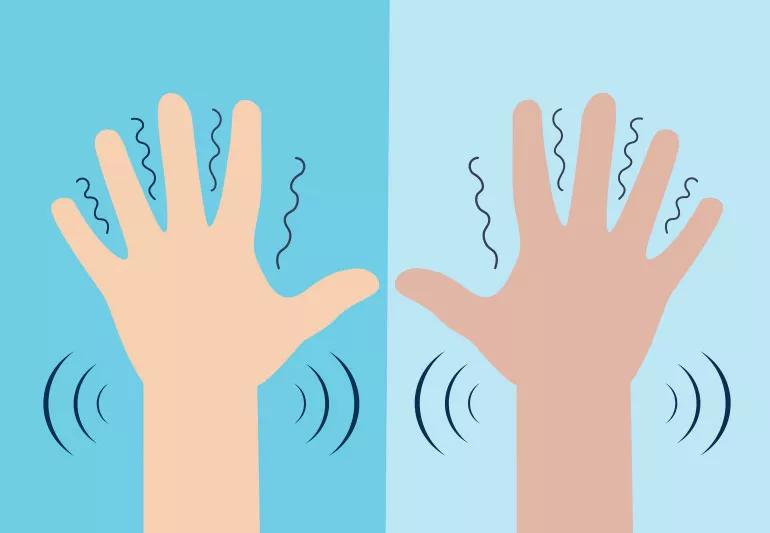What to watch for and when to seek help

Image content: This image is available to view online.
View image online (https://assets.clevelandclinic.org/transform/969428fa-b413-4f08-a090-dec0f87d5a5d/shakyHandsElder-1201217609-770x533_jpg)
illustration of shaky hands
Occasional trembling and shaky hands can occur at any age, but are more likely the older you get. If you notice this sign in yourself or a loved one, you may fear the worst.
Advertisement
Cleveland Clinic is a non-profit academic medical center. Advertising on our site helps support our mission. We do not endorse non-Cleveland Clinic products or services. Policy
When people see shaking and tremor in older adults, they think of Parkinson’s disease, a chronic movement disorder that can lead to other problems.
But neurologist Michal Gostkowski, DO, says you shouldn’t jump to this conclusion.
“The biggest misconception about shaking and aging is that it means a person has Parkinson’s disease,” he says.
There are five things to keep in mind when you or a loved one notice a tremor.
If shaking occurs during an action — reaching for something, writing, steadying a cup of coffee — that’s called an active tremor. Active tremors do not usually point to a serious neurological disorder such as Parkinson’s disease.
Even so, Dr. Gostkowski says it’s a good idea to talk to your doctor, who will look for underlying causes. For example, essential tremor, another much more common movement disorder, frequently occurs after age 50. Once the cause of an active tremor is identified, doctors can treat it.
If shaking occurs when the hands are at rest — for example, folded in your lap — that’s called a resting tremor. If a resting tremor develops suddenly or worsens over time, it’s important to see a doctor right away. Resting tremor may be a sign of Parkinson’s disease.
Some people are more likely than others to develop shakiness as they get older. Essential tremor is commonly passed down genetically through families, for example.
Advertisement
“Active tremors are not necessarily inevitable as we age, but if your parents had age-related shakiness, you’re more likely to have it too,” Dr. Gostkowski says.
Anxiety, stress, fatigue, low blood sugar or too much caffeine can cause or worsen a tremor.
So can many types of drugs. Shakiness may be more intense or occur more often if you or a loved one are taking:
Talk to your doctor about making a change if you suspect a prescription is causing active tremor.
The drugs used to treat tremor tend to be sedating. Ask whether it’s safe to drive a car or perform work duties while taking them. Sedatives also may not interact well with other drugs, which you’re more likely to take as you age. So ask about potential problem drug interactions.
At best, medications can slow tremor but rarely stop it completely. When drugs are unable to control an active tremor, other treatment options are deep brain stimulation or high-frequency ultrasound ablation.
In deep brain stimulation, a neurosurgeon implants electrodes in the brain. The electrode uses a small amount of electricity to normalize brain circuitry and reduce tremor.
“Many patients are reluctant to consider surgery at first, but after the procedure, they wish they’d done it sooner,” Dr. Gostkowski says.
Whether you or your loved one has occasional shaking or it happens all the time, it’s best to talk to your doctor about your concerns. The sooner you address the issue, the better. Your doctor can identify ways to treat it immediately.
And if it turns out there is no cause for concern at all, you’ll have peace of mind — and that’s priceless.
Advertisement

Sign up for our Health Essentials emails for expert guidance on nutrition, fitness, sleep, skin care and more.
Learn more about our editorial process.
Advertisement
Your tolerance decreases with age, thanks to body changes, health conditions and medications you may take
Exercising and stretching your lower back, hamstrings, hips and quads can greatly improve your physical well-being
Many chronic conditions can cause fatigue — but don’t overlook mental health concerns, iron level and hormones
These neurological conditions affect muscle movement in separate ways
Some osteoporosis medications help slow bone breakdown, while others help grow new bone — what’s best for you depends on your needs
Use a gentle, nonjudgmental tone, focus on prevention and reassure them that age-related memory issues can have a variety of causes
From influenza and COVID-19 to pneumococcal, shingles and more, vaccines help keep you healthy
If you’re frequently dealing with short-term memory loss, confusion or issues around spatial awareness, you may need to see a neurologist
Prioritize your health by managing stress, strengthening your social connections and getting quality sleep
Bolsters, blankets, pillows and blocks can offer extra support, stability and comfort
Allergies, postnasal drip, asthma or reflux could be to blame for a cough that won’t quit